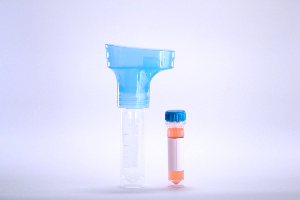Share this
saliva microsampling provides valuable data in research & beyond
by Neoteryx Microsampling on May 17, 2021 10:16:39 AM
 Saliva collection provides many advantages compared to other specimen collection options, such as urine collection. First, no professional training is needed for the specimen collection process. Second, it allows for remote sample collection by study participants, offering a high level of convenience. Some researchers have provided Mitra® devices to their study subjects for at home for self-collection of saliva samples.
Saliva collection provides many advantages compared to other specimen collection options, such as urine collection. First, no professional training is needed for the specimen collection process. Second, it allows for remote sample collection by study participants, offering a high level of convenience. Some researchers have provided Mitra® devices to their study subjects for at home for self-collection of saliva samples.
Additional benefits of saliva sampling include:
- The method is non-invasive and painless
- It has a low risk of disease transmission
- Saliva does not clot like other bio-fluids (i.e., blood)
- Saliva samples can be stored for a longer time than other bio-fluids
Although research scientists say that a blood test provides more accurate results, a saliva test can be used to identify many substances and many biomarkers of disease. To provide the level of accuracy and specificity that research scientists require, saliva samples can be processed using more advanced equipment and special reagents.
Where is Saliva Sampling Applicable?
Saliva sampling is applicable in several research areas, as follows:
Infectious Disease Screening
When studying COVID-19 illness during the coronavirus pandemic, researchers realized that using saliva samples was a viable approach. The viral load is often higher in saliva than it is in other bio-fluids, such as in nasopharyngeal mucus.
During the Coronavirus Pandemic, researchers at Yale School of Public Health helped devise a new saliva test called ‘SalivaDirect,’ which aimed to simplify the collection and analysis processes while maximizing the efficiency of COVID-19 testing. With this test, a person spits into a sterilized container, which is sent to the lab for testing.
In the lab, the use of readily available enzymes instead of specialized and expensive reagents makes this saliva testing approach easier and more cost effective than conventional saliva testing. Lab techs also use PCR technology to quicken the process and further reduce costs. The group implementing SalivaDirect received Emergency Use Authorization (EUA) to use it during the COVID-19 crisis in advance of more formal approval.
Drug and Alcohol Screening
Saliva samples are useful in screening for alcohol, marijuana, cocaine, methamphetamine, and amphetamines. Saliva can provide accurate results, if the subject has used the substance recently. LabCorp reports that a drug can be detected in saliva less than an hour after last use and it remains detectable for up to 48 hours.
This timeframe can depend on the drug used, the dose, and the route of administration. Saliva sampling and testing are therefore helpful in traffic enforcement programs, where the primary concern is stopping people from driving soon after using a substance that impedes their ability to drive safely.
Health Screening
Saliva samples can be used to screen people for vitamin and hormone levels. Saliva samples provide accurate data for these tests, and also reflect any absorbed and bioavailable hormones. Sometimes, however, a blood test may also be necessary because saliva tests have high variability. With remote specimen collection kits that contain devices for sampling both saliva and blood specimens, people can be screened for hormone levels at different time points, as well as for a range of health conditions.
Many researchers use Mitra® devices based on VAMS® technology from Trajan Scientific and Medical. These are portable, easy to use, and can be used to collect a small, precise amount of saliva, blood or other bio-fluid.
Share this
- Microsampling (206)
- Research, Remote Research (119)
- Venipuncture Alternative (105)
- Clinical Trials, Clinical Research (83)
- Mitra® Device (73)
- Therapeutic Drug Monitoring, TDM (51)
- Dried Blood Spot, DBS (39)
- Biomonitoring, Health, Wellness (30)
- Infectious Disease, Vaccines, COVID-19 (24)
- Blood Microsampling, Serology (23)
- Omics, Multi-Omics (21)
- Decentralized Clinical Trial (DCT) (20)
- Specimen Collection (18)
- Toxicology, Doping, Drug/Alcohol Monitoring, PEth (17)
- Skin Microsampling, Microbiopsy (14)
- hemaPEN® Device (13)
- Preclinical Research, Animal Studies (12)
- Pharmaceuticals, Drug Development (9)
- Harpera Device (7)
- Industry News, Microsampling News (5)
- Antibodies, MAbs (3)
- Company Press Release, Product Press Release (3)
- Environmental Toxins, Exposures (1)
- July 2025 (1)
- May 2025 (1)
- April 2025 (2)
- December 2024 (2)
- November 2024 (1)
- October 2024 (3)
- September 2024 (1)
- June 2024 (1)
- May 2024 (1)
- April 2024 (4)
- March 2024 (1)
- February 2024 (2)
- January 2024 (4)
- December 2023 (3)
- November 2023 (3)
- October 2023 (3)
- September 2023 (3)
- July 2023 (3)
- June 2023 (2)
- April 2023 (2)
- March 2023 (2)
- February 2023 (2)
- January 2023 (3)
- December 2022 (2)
- November 2022 (3)
- October 2022 (4)
- September 2022 (3)
- August 2022 (5)
- July 2022 (2)
- June 2022 (2)
- May 2022 (4)
- April 2022 (3)
- March 2022 (3)
- February 2022 (4)
- January 2022 (5)
- December 2021 (3)
- November 2021 (5)
- October 2021 (3)
- September 2021 (3)
- August 2021 (4)
- July 2021 (4)
- June 2021 (4)
- May 2021 (4)
- April 2021 (3)
- March 2021 (5)
- February 2021 (4)
- January 2021 (4)
- December 2020 (3)
- November 2020 (5)
- October 2020 (4)
- September 2020 (3)
- August 2020 (3)
- July 2020 (6)
- June 2020 (4)
- May 2020 (4)
- April 2020 (3)
- March 2020 (6)
- February 2020 (3)
- January 2020 (4)
- December 2019 (5)
- November 2019 (4)
- October 2019 (2)
- September 2019 (4)
- August 2019 (4)
- July 2019 (3)
- June 2019 (7)
- May 2019 (6)
- April 2019 (5)
- March 2019 (6)
- February 2019 (5)
- January 2019 (8)
- December 2018 (3)
- November 2018 (4)
- October 2018 (7)
- September 2018 (6)
- August 2018 (5)
- July 2018 (8)
- June 2018 (6)
- May 2018 (5)
- April 2018 (6)
- March 2018 (4)
- February 2018 (6)
- January 2018 (4)
- December 2017 (2)
- November 2017 (3)
- October 2017 (2)
- September 2017 (4)
- August 2017 (2)
- July 2017 (4)
- June 2017 (5)
- May 2017 (6)
- April 2017 (6)
- March 2017 (5)
- February 2017 (4)
- January 2017 (1)
- July 2016 (3)
- May 2016 (1)
- April 2016 (2)



No Comments Yet
Let us know what you think